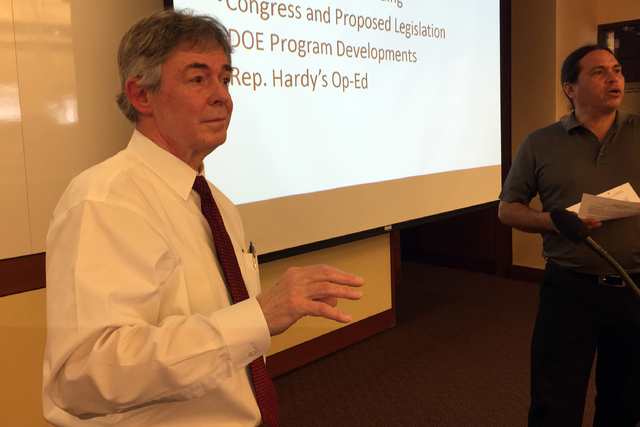
LAS VEGAS — After 28 years, Nevada’s battle against the federal government’s still-smoldering plans to bury the nation’s highly radioactive waste in Yucca Mountain has finally come “down to the brass tacks,” with the prospect for formal licensing hearings on the horizon and renewed debate on scientific issues.
That’s according to Nevada Nuclear Projects Agency Director Robert Halstead, who used last week’s Native American Youth Awareness Forum on Nuclear Issues to take aim at a notion by U.S. Rep. Cresent Hardy, that it’s time for Nevada to join the discussion about a proposal to open a nuclear waste repository at Yucca Mountain.
“I’m hoping Representative Hardy means what he says when he says he wants to see the safety first,” Halstead said during Thursday’s session of the two-day forum organized by Western Shoshone Ian Zabarte at UNLV’s Boyd School of Law.
Halstead noted that the state has 219 valid safety issues: from transporting the waste across the nation to suspected flaws with engineered barriers that state scientists say are designed to fail because water trickling through the ridge will corrode them, allowing radioactive particles to escape into the environment and contaminate groundwater.
A slide in Halstead’s presentation highlighted Hardy’s March 25 guest column in the Pahrump Valley Times among “recent developments” that include the Nuclear Regulatory Commission’s licensing proceeding for the Yucca Mountain site and proposed legislation that would require a state’s consent before a repository could be built.
Hardy, whose district includes all of Nye and Esmeralda counties, plans to visit Yucca Mountain’s exploratory tunnel April 9 with a group of out-of-state congressmen who hope the site someday will be permitted for nuclear waste disposal. In his op-ed piece, he wrote: “When was the last time someone from the Department of Energy or the White House asked the most basic of questions: Is there a scenario in which Nevadans would actually welcome nuclear waste storage at Yucca Mountain, northwest of Las Vegas?”
In “what if” fashion, Hardy hinted at possibilities of financial benefits for Nevada’s schools and fulfilling Southern Nevada’s water needs from the Colorado River, and even obtaining “greater leverage in our quest for better transportation and infrastructure funding.”
During Thursday’s forum, Halstead said he found it “strange that (Hardy) didn’t mention the Nuclear Waste Informed Consent Act” legislation that was introduced by U.S. Sens. Dean Heller, R-Nev., and Harry Reid, D-Nev., with a companion House bill endorsed by Reps. Joe Heck, R-Nev., and Dina Titus, D-Nev.
Reacting to Halstead’s comments, Hardy said in an email Friday that “none of this matters if it isn’t safe, and safety must remain the top priority in this discussion.”
“Nevadans must continue to demand a rigorous, scientific evaluation of all factors involved, and we will not accept the rest of the country forcing any unmitigated risks into our backyard,” Hardy wrote. “Nevada residents deserve that, and so do the 40 million people who visit the region each year. As I’ve said, nothing should be crammed down our throat — especially not for the political expediency of people who don’t live here.”
Yucca Mountain, 100 miles northwest of Las Vegas, has been the only site studied for disposing of 77,000 tons of used nuclear fuel from commercial power reactors and the nation’s highly radioactive defense waste since Congress passed the so-called “Screw Nevada Bill” in 1987 that singled out the remote, volcanic-rock ridge.
After more than two decades of consistent opposition to the Department of Energy’s Yucca Mountain Project by Nevada’s congressional delegation, Halstead was asked what the impact will be if Hardy strays from the flock.
“My personal feeling — not speaking for the governor, not speaking for the Commission (on Nuclear Projects) — I honestly don’t think it’s going to be that significant precisely because he didn’t get into the details of the safety debate,” Halstead said.
“The safety debate is just starting,” he said, adding, “We’re prepared to go every inch of the licensing proceeding.”